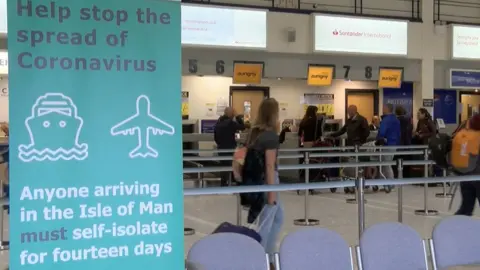Coronavirus: Isle of Man to allow seven-day self-isolation
 BBC
BBCResidents returning to the island can now self-isolate for seven days if they pay for a Covid-19 test and the result is negative, the chief minister said.
Currently, anyone arriving on the Isle of Man must self-isolate for 14 days.
From Monday, returning residents can pay £50 to be tested for coronavirus after a week and will be allowed to leave their home, under certain restrictions, if it is negative.
Howard Quayle said the approach had "worked well" in other jurisdictions.
He added that the changes would "maintain the safety" of the island and provide "more freedom and flexibility" for those who needed to leave.
Charging people for the test would "cover the cost of the taxpayer" as providing it for free was "unfair" to those who do not travel, he said.
Minimising the risk
Guernsey, which has an air bridge with the island, introduced a similar approach last month, though residents are not required to pay for their test.
Under the changes, any returning residents would be able to arrange a test on what would be their seventh day of self-isolation, with results being made available the following day.
Those that test negative for the virus will be allowed to exit self-isolation and return to work, provided their job does not involve contact with members of the public, such as retail workers.
Certain restrictions will remain, even with a negative result, until 14 days after a person returns to the island to "minimise the risk" in the event of a false negative, Mr Quayle said.
Anyone leaving self-isolation after seven days will not be allowed to attend any indoor venues, such as restaurants, theatres and pubs.
The island's borders were closed to most on 27 March but reopened to residents on 20 July.

Why not follow BBC Isle of Man on Facebook and Twitter? You can also send story ideas to [email protected]
